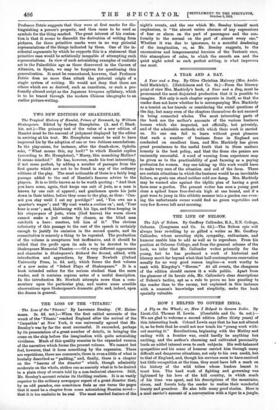TEE LOSS OF THE
The Loss of the Titanic.' By Lawrence Beesley. (W. Heine- mann. 3s. 6d. net.)—When the first cabled accounts of the wreck of the ' Titanic ' reached England after the arrival of the Carpathia' at New York, it was universally agreed that Mr. Beesley's was by far the most successful. It succeeded, perhaps by its presentation of a great number of details, in bringing the scene on the ship before the imagination with quite astonishing vividness. Much of this quality remains in the expanded version of the narrative which forms the present volume. We cannot but feel, however, that it loses something by the expansion. There are repetitions, there are comments, there is even a little of what is brutally described as "padding," and, finally, there is a chapter on the "lessons of the disaster" which, though admirably moderate on the whole, strikes one as scarcely what is to be desired in a plain story of events told by a non-technical observer. Still, Mr. Beesley's account retains its thrilling realism. It is so vastly superior to the ordinary newspaper report of a great disaster that, by an odd paradox, one sometimes feels as one turns the pages that it must be a chapter from some astonishing Russian novel— that it is too realistic to be real The most marked feature of the
night's events, and the one which Mr. Beesley himself most emphasizes, is "the almost entire absence of any expressions of fear or alarm on the part of passengers and the con. formity to the normal on the part of almost every one." Whether it was due to ignorance, to a merciful deadening of the imagination, or, as Mr. Beesley suggests, to the unconscious and temperamental heroism of the Teutonic race, this atmosphere of calm, to which the smooth sea and the quiet night acted as such perfect setting, is what impresses one most.


































































 Previous page
Previous page